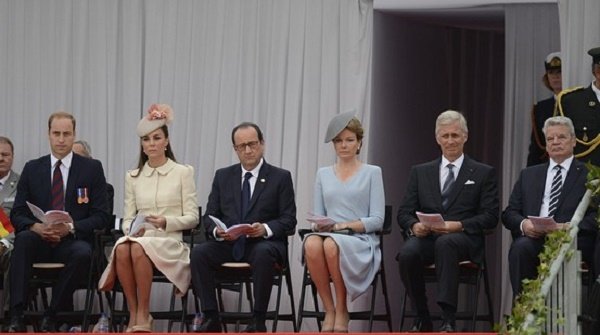
There are still a few countries that owe everything to their ability to win wars: Israel comes to mind at once. But most countries, and most people, now see war as a very undesirable last resort. We have the First World War to thank for this great change.
GWYNNE DYER
It was not worth even one life, said Harry Patch shortly before he died in 2009 at the age of 111. He was the last survivor of the 65 million soldiers who fought in the First World War, and by the time he died it was a normal, quite unremarkable thing to say. But he would never have said it in 1914.
Very few people thought that war was a bad thing in 1914. LOSING a war could be a bad thing, but the obvious solution to that problem was to be very good at war. Human beings had always fought wars, military values were deeply embedded in our culture, and nobody expected those attitudes to change. And then they did change.
The First World War was a human tragedy, of course, but this was when the human race began to question the whole institution of war: how useful it is, but also how inevitable it really is. And the answer to both questions is: not very.
There are still a few countries that owe everything to their ability to win wars: Israel comes to mind at once. But most countries, and most people, now see war as a very undesirable last resort. We have the First World War to thank for this great change.

The thing most people miss about the First World War is that it was a perfectly normal political event. Ever since the rise of modern centralised states in 16th-century Europe, they had all gone to war with each other in two big alliances at around half-century intervals. The wars were effectively about everything: borders in Europe, trade routes, colonies in Asia, Africa and the Americas.
The great powers fought other, littler wars as well, but these big events – the 30 Years’ War, the War of the Spanish Succession, the Seven Years’ War and so on – were like a general audit of their status. Who’s up, and who’s down? Who can expand, and who must yield?
It was a perfectly viable system, because the wars mostly involved small professional armies and did not disturb civilian populations much. The casualties were low, and hardly any major player ever crashed out of the system entirely. Naturally enough, most people did not see this system as a problem that had to be solved. It was just another fact of life.
The only diplomatic difference in 1914 was that the great powers coordinated their moves better than before. Almost all of them were at war in a few days, where it would have taken months or even a few years in the old days. The armies could move quickly to the frontiers by rail, so now you created your alliances BEFORE the war – and everybody had the telegraph , so the final decisions were made fast.
But once the war started, everything was different. The armies were ten times as big as they used to be, because these were now rich industrialized countries that could afford to put most of the adult male population into uniform. That meant that the soldiers getting killed were fathers, brothers, husbands and sons: part of the community, not the wastrels, drunks and men on the run who made up such a large part of the old professional armies.
And they were getting killed in unprecedented numbers. The new weapons – machine guns, modern artillery and so on – were very efficient killing machines, and within a month the soldiers had to take shelter in trenches from the “storm of steel”. They spent the rest of the war trying to break through the trenches, and by the end of it 9 million of them had been killed. THAT is what changed everything.
One response to the ordeal, inevitably, was to demonize the other side and define the war as a crusade against evil. That way, at least, the ghastly sacrifice of lives could be seen as necessary and meaningful. But many people saw through the propaganda, and some of them were in high places.
The senior politicians and diplomats of 1918, living amid the wreckage of the old world, could see that the old international system was now delivering catastrophe, and had to be changed. So they set out to change it, by creating the League of Nations. They outlawed aggressive war, and invented the concept of “collective security” to enforce the new international rules.
They failed, at first, because the legacy of bitterness among the losers in the First World War was so great that a second one came only twenty years later. That one was bigger and worse – but at the end, everybody tried again. They had to.
The United Nations was founded in 1945, with slightly more realistic rules than the League of Nations but the same basic goal: to stop wars among the great powers, for those are the wars that kill in the millions. Stopping other wars too would be nice, but first things first – especially now that there are nuclear weapons around.
All you can say is that it hasn’t failed yet in its main task: no great power has fought any other one directly for the past 69 years. Ignore the headlines that constantly tell you the world is falling apart. The glass is more than half-full.
_______________________________________________________________________
All opinions and views expressed in columns and blogs and comments by readers are those of individual writers and do not necessarily reflect the editorial policy of Caravan

